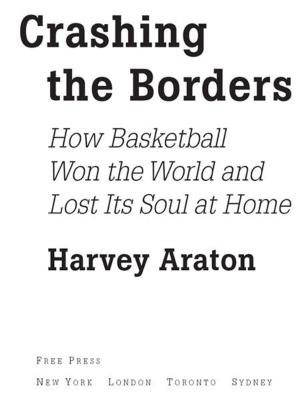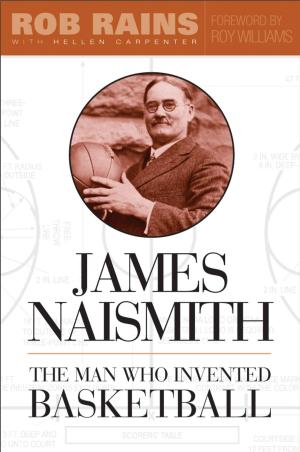The Legend of Red Klotz
How Basketball’s Loss Leader Won Over the World—14,000 Times
Biography & Memoir, Sports| Author: | Tim Kelly | ISBN: | 9781935232766 |
| Publisher: | ComteQ Publishing | Publication: | October 31, 2013 |
| Imprint: | Language: | English |
| Author: | Tim Kelly |
| ISBN: | 9781935232766 |
| Publisher: | ComteQ Publishing |
| Publication: | October 31, 2013 |
| Imprint: | |
| Language: | English |
Red Klotz helped introduce the game of basketball to more than 100 countries around the world during a career spanning back to the 1920s. As owner of the Washington Generals for 60-plus years, Red played in and/or coached—and lost—more than 14,000 games to the Harlem Globetrotters. However, in 1971, his long, two-hand set shot with three seconds left, earned the Generals their first-ever victory over the Globetrotters. Despite a 42-year losing streak since that surprising upset, Red Klotz is a winner. And at 5’7” Red is still the shortest player to win an NBA championship—with the 1948 Baltimore Bullets. The Legend of Red Klotz traces the unlikely journey of the game's most-traveled man. As you will see in this wonderful book by Tim Kelly, it is impossible to sum up the amazing Red Klotz in a single story. But I like to think of this one: We were sitting in his office and all of a sudden he said: “You know, I was almost on the cover of Sports Illustrated one time.” To prove this, he pointed to a photograph on his wall – it was a mock-up of a Sports Illustrated cover. Red Klotz was on it. “They never used this?” I asked, already knowing the answer. “No,” he said. “You know what they used instead?” “What?” “A beautiful woman in a bathing suit,” he said, and he smiled. Then Red looked out the window over the Atlantic Ocean like he had countless times before. “What chance did I have,” he asked, “against a beautiful woman in a bathing suit.” Isn’t that perfect? Red Klotz lost more basketball games than any man who ever lived. He lost games with the New Jersey Reds, with the New York Nationals and with the Atlantic City Seagulls. He lost games with the Boston Shamrocks and Chicago Demons and Baltimore Rockets. He lost games with the International All-Stars and, most of all, with the ubiquitous Washington Generals. He lost all these games to the Harlem Globetrotters or, as he inevitably called them, “The World Famous Harlem Globetrotters.” He lost basketball games in all sorts of places in all sorts of countries all over the world. He lost game inside and outside, on dirt and concrete, on sand and ice, on a battleship and in a jail. He did not just lose games. He had his pants pulled down. He had buckets of water splashed on him. He fell for the hiding ball trick time and again. He chased after Globetrotters and chased after them and never caught them. He also crossed that ocean outside his window too many times to count. In the end, you find that winning and losing is what you make of it. There are countless so-called winners who cannot find happiness. Then there’s Red Klotz, still with Gloria 75 years after they met on a beach, surrounded by loving family and a million memories, living in that wonderful little house in a little beach town by the Atlantic Ocean. He belongs in the Basketball Hall of Fame for all the joy he’s brought people and all the long jump shots he has swished around the world, but they haven’t voted him in yet. Sometimes people miss what’s right in front of them. Red Klotz lost games. But he won everything else. “Look out there,” he said to me, and he pointed out toward the ocean. “Yes, it’s beautiful,” I said. “You know,” he told me, “every day it looks different. Every single day.” “Because of the weather?” I asked. “No,” he said. “Because of the ocean.”
Red Klotz helped introduce the game of basketball to more than 100 countries around the world during a career spanning back to the 1920s. As owner of the Washington Generals for 60-plus years, Red played in and/or coached—and lost—more than 14,000 games to the Harlem Globetrotters. However, in 1971, his long, two-hand set shot with three seconds left, earned the Generals their first-ever victory over the Globetrotters. Despite a 42-year losing streak since that surprising upset, Red Klotz is a winner. And at 5’7” Red is still the shortest player to win an NBA championship—with the 1948 Baltimore Bullets. The Legend of Red Klotz traces the unlikely journey of the game's most-traveled man. As you will see in this wonderful book by Tim Kelly, it is impossible to sum up the amazing Red Klotz in a single story. But I like to think of this one: We were sitting in his office and all of a sudden he said: “You know, I was almost on the cover of Sports Illustrated one time.” To prove this, he pointed to a photograph on his wall – it was a mock-up of a Sports Illustrated cover. Red Klotz was on it. “They never used this?” I asked, already knowing the answer. “No,” he said. “You know what they used instead?” “What?” “A beautiful woman in a bathing suit,” he said, and he smiled. Then Red looked out the window over the Atlantic Ocean like he had countless times before. “What chance did I have,” he asked, “against a beautiful woman in a bathing suit.” Isn’t that perfect? Red Klotz lost more basketball games than any man who ever lived. He lost games with the New Jersey Reds, with the New York Nationals and with the Atlantic City Seagulls. He lost games with the Boston Shamrocks and Chicago Demons and Baltimore Rockets. He lost games with the International All-Stars and, most of all, with the ubiquitous Washington Generals. He lost all these games to the Harlem Globetrotters or, as he inevitably called them, “The World Famous Harlem Globetrotters.” He lost basketball games in all sorts of places in all sorts of countries all over the world. He lost game inside and outside, on dirt and concrete, on sand and ice, on a battleship and in a jail. He did not just lose games. He had his pants pulled down. He had buckets of water splashed on him. He fell for the hiding ball trick time and again. He chased after Globetrotters and chased after them and never caught them. He also crossed that ocean outside his window too many times to count. In the end, you find that winning and losing is what you make of it. There are countless so-called winners who cannot find happiness. Then there’s Red Klotz, still with Gloria 75 years after they met on a beach, surrounded by loving family and a million memories, living in that wonderful little house in a little beach town by the Atlantic Ocean. He belongs in the Basketball Hall of Fame for all the joy he’s brought people and all the long jump shots he has swished around the world, but they haven’t voted him in yet. Sometimes people miss what’s right in front of them. Red Klotz lost games. But he won everything else. “Look out there,” he said to me, and he pointed out toward the ocean. “Yes, it’s beautiful,” I said. “You know,” he told me, “every day it looks different. Every single day.” “Because of the weather?” I asked. “No,” he said. “Because of the ocean.”















